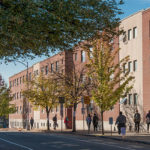Counseling Services at Russell Sage College
We provide short-term supportive services to maximize students academic performance and personal experience. Our counselors provide assessment and brief counseling. They are generalists, and if they identify needs that are out of their scope, they will refer to specialists in the community to ensure the highest level of care.
Russell Sage College’s Wellness Center Counseling Services provides short-term individual and couples counseling free of charge for currently enrolled undergraduate and graduate students.
Session limit: There is a session limit of eight sessions a semester at the clinician’s discretion. The need for more sessions can be considered on a case-by-case basis.
Group counseling may also be provided according to students’ needs and interest. Students who require more long-term or intensive services will be referred to community providers.
Counseling services are provided by a staff of New York state licensed mental health professionals and supervised graduate-level interns. Counseling Services also works in collaboration with locally licensed psychiatric nurse practitioners to provide medication management and consultation services for clients receiving counseling services. Theses medication management services are located in Latham, Albany and Clifton Park.
Counseling Services also provides the following:
- Crisis intervention
- Mandated mental health and/or substance-abuse assessments
- Consultations to faculty, staff, students and parents
- Referrals to on-campus and off-campus services
Common issues often addressed in counseling (but not limited too): depression, anxiety, stress, anger, relationship difficulties, alcohol and substance abuse, sexual assault and/or rape, motivation, self confidence, (etc).
Support Services for Students
Students may visit the Wellness Center on either campus. Counselors will be available to assist students. Please feel free to contact one of our counseling staff providers if you have any questions.
Hours: 8:30 a.m. – 5 p.m. (Monday – Friday)
After-hours and Crisis Mental Health Resources
After hours (students) may contact these community resources:
For additional resources please visit our page on After-Hours care.
Warmlines: A warmline, (also known as a helpline or hopeline), is a phone number people can call to get support and learn about available mental health and recovery resources. These are often staffed by people with lived experience of mental health issues to provide peer support and information.
- Albany County CAP Careline:
518-427-5056
7 days a week, from 5pm-1am
Hotlines: A crisis hotline (also known as a lifeline), is a phone number people can call to get immediate emergency telephone counseling.
Dial 211 24/7 for help.
The 211 service statewide will connect anyone, free of charge to a warm or crisis line or to any health or human service. You do NOT need minutes on your phone to contact 211, and if you tell them that you don’t have minutes on your cell phone, they will TRY to connect you directly to the service you require.
The 988 Suicide & Crisis Lifeline connects you to trained crisis counselors 24/7. They can help anyone thinking about suicide, struggling with substance use, experiencing a mental health crisis, or any other kind of emotional distress. You can also call, text or chat 988 if you are worried about someone you care about who may need crisis support.
When you CALL 988:
You will hear a greeting message and be given a choice of who to connect with. There are specially trained counselors available for Veterans, Spanish speakers, or LGBTQI+ youth and young adults.
Your call is then routed to an official Lifeline crisis center based on your selections and area code.
When you TEXT 988:
Your contact is routed to an official Lifeline crisis center based on your area code.
When you CHAT 988:
You’ll get a pre-chat survey before connecting with a counselor to identify the main area of concern.
Your contact is routed to an official Lifeline crisis center based on your IP address.
No matter WHICH WAY you reach out
A trained behavioral health crisis counselor will listen to you. They will work to understand how your problem is affecting you, provide personal support and get you the help you need. Follow up services will be offered.
Assistance for Employees and Telehealth
The college also has support services available to employees through the Employee Assistance Program. Please see the following information for details.
Appointments
Appointments are required for all counseling sessions, however students who walk-in concerning a crisis will be seen by the next available counselor.
The Wellness Center is located in Kellas Hall on the Troy campus and on the bottom floor of Kahl Campus Center on the Albany campus. By phone, you can reach us in Troy at 518-244-2261 or in Albany at 518-292-1917.
Our hours of operation are Monday-Friday from 9 a.m. to 5 p.m. during the academic school year. Counseling Services are not available during school breaks or during the summer months.
Common Issues
Coming to counseling is not a sign of weakness. Most people seek counseling when their usual ways of handling problems aren’t working well for some reason. They may have found that talking to friends or family about their problem is not the best option. Many students who come feel upset in some way, depressed, angry, confused, lonely or overwhelmed. These upsetting feelings may have been set off by a number of situations including:
- Relationship difficulties
- Family problems
- Stress
- Depression or anxiety
- Eating disorders and body image issues
- Homesickness
- Alcohol and drug issues
- Time management problems and procrastination
- Difficulty sleeping
- Grief and loss
- Coping with a traumatic experience
- Low self-esteem
- Sexual Orientation
- ADHD
There are many other reasons people come for counseling. Counseling is a chance to learn more about yourself; learn how to resolve personal problems that are getting in the way of being a successful student; talk with someone not personally involved with a situation who can give feedback from a different perspective; and learn new skills and ways of looking at situations to become more capable at solving problems in the future.
Online Mental Health Screening
Screen Yourself for FREE!
Anonymous and Confidential**
The purpose of providing students with mental health screenings is to enable students to see whether their concerns may need further attention. The screenings also are used to indicate a possible need for services, including mental health counseling.
**All mental health screenings are completely anonymous. (Anonymous means that there is no way that anyone can identify that you have taken a mental health screening. No identifying information is provided to the Wellness Center.)
- Alcohol Use
It is common knowledge that college students are at a high risk to use and possibly abuse alcohol. College culture normalizes this experience for students. However, 31% of students met the criteria for a diagnosis of alcohol abuse and 6% met the criteria for alcohol dependence (collegedrinkingprevention.gov, 2010). Moreover, 25% of students report experiencing difficulty with academic tasks as a result of their alcohol consumption, due to higher incidences of missing class, falling behind and generally performing poorly with academic tasks (collegedrinkingprevention.gov, 2010). - Anxiety Disorders
Anxiety is a common issue for college students. This is due to the increased amount of stress and pressure college students often experience. According to the Anxiety Disorders Association of America (2012), approximately 40 million adults suffer from anxiety disorders in the United States and 75% of those adults experience their first episode by age 22. Moreover, 80% of college students report experiencing daily stress (Anxiety Disorders Association of America, 2012). - Bipolar Disorder
Bipolar disorder, also known as manic-depression, is a type of mental illness that involves a disorder of affect or mood. The person’s mood usually swings between overly “high” or irritable to sad and hopeless, and then back again, with periods of normal mood in between. Symptoms include extreme irritability and distractibility, excessive “high” or euphoric feelings, increased energy, activity, restlessness, racing thoughts, rapid speech, decreased need for sleep, unrealistic beliefs in one’s abilities and powers, increased sexual drive, abuse of drugs or alcohol, reckless behavior such as spending sprees, rash business decisions, or erratic driving, and in severe cases, hallucinations and loss of reason - Depression
Depression is also a common issue among college students. According to the National Institute of Mental Health (2012), 3o% of college students felt so depressed that they experience difficulty functioning. Therefore, if you feel as though you may be experiencing symptoms of depression, it may be beneficial to utilize the screening tool to determine whether mental health services could improve your well-being. - Eating Disorders
There are much higher numbers of college students having eating disorders when compared to the general population; 25% of college students experience symptoms of anorexia, bulimia or compulsive overeating compared to 5% of the general population (National Institute of Mental Health, 2012.). Therefore, due to the possibility of both mental and physical health consequences as a result of eating disorders, it is important to understand the severity of the disorder and whether it could be beneficial to receive additional services to overcome this issue. - Post-traumatic Stress Disorder (PTSD)
Post-traumatic stress disorder affects people who have experienced a traumatic event such as military combat, natural disasters, terrorist incidents, serious accidents or personal assaults, such as rape. Symptoms include nightmares and flashbacks, difficulty sleeping and feelings of detachment/estrangement. Symptoms can be persistent and severe enough to significantly impair a patient’s daily life.
Confidentiality
All counseling services staff is expected to abide by the American Psychological Association and American Counseling Associations standards of Ethical Principles. Both the law and the ethics of professional practice in psychology and counseling require that information discussed during counseling sessions be kept strictly confidential.
No information about students seen for counseling can be shared with anyone outside the Wellness Center without the students written consent. Exceptions to this policy include: when a student presents a clear and imminent danger to him/herself or others; when there is suspicion of child or elder abuse; and in the event of a lawsuit in which records are subpoenaed.
A Note to Parents
We recognize that parents are the best experts on your student’s moods and behaviors and that you may, at one time or another, have concerns in this area. Although counseling staff cannot confirm or deny that your student is in counseling or share any confidential information with you, we want to hear your concerns and will make every effort to utilize your information in trying to be helpful to your student.



